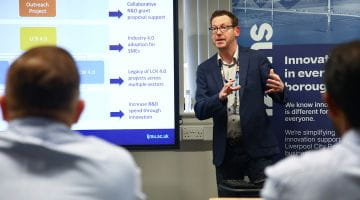2024/25 entry
DPPH Doctor Professional Practice in Health (DPPH)
About this course
The Doctorate in Professional Practice in Health (DPPH) will enhance your understanding of health from a wider context, this will enable you to directly relate your learning to current healthcare practice
This programme is being validated for January start date (instead of September 2024)
Fees and funding
There are many ways to fund postgraduate study for home and international students
Fees
The fees quoted at the top of this page cover registration, tuition, supervision, assessment and examinations as well as:
- library membership with access to printed, multimedia and digital resources
- access to programme-appropriate software
- library and student IT support
- free on-campus wifi via eduroam
Additional costs
Although not all of the following are compulsory/relevant, you should keep in mind the costs of:
- accommodation and living expenditure
- books (should you wish to have your own copies)
- printing, photocopying and stationery
- PC/laptop (should you prefer to purchase your own for independent study and online learning activities)
- mobile phone/tablet (to access online services)
- field trips (travel and activity costs)
- placements (travel expenses and living costs)
- student visas (international students only)
- study abroad opportunities (travel costs, accommodation, visas and immunisations)
- academic conferences (travel costs)
- professional-body membership
- graduation (gown hire etc)
Funding
There are many ways to fund postgraduate study for home and international students. From loans to International Scholarships and subject-specific funding, you’ll find all of the information you need on our specialist postgraduate funding pages.
Please be aware that the UK’s departure from the EU may affect your tuition fees. Learn more about your fee status and which tuition fees are relevant to you.
£3,937.50 is the fee for years one and two
£2,625 is the fee for years three and four
£1,050 is the fee for year five
Employability
Further your career prospects
LJMU has an excellent employability record with 96% (HESA 2018) of our postgraduates in work or further study six months after graduation. Our applied learning techniques and strong industry connections ensure our students are fully prepared for the workplace on graduation and understand how to apply their knowledge in a real world context.
The student experience
Discover life as a postgraduate student at LJMU.
News and views
Browse through the latest stories and updates from the University and beyond
Course modules
Discover the building blocks of your programme
Your programme is made up of a number of core modules which are part of the course framework. Some programmes also have optional modules that can be selected to enhance your learning in certain areas and many feature a dissertation, extended report or research project to demonstrate your advanced learning.
The DPPH is split in to three stages.
Stage 1 includes two taught modules. The duration for this stage is two years and it is delivered in intense teaching blocks.
- Professional identity, theory, and practice (30 credit) is a year-long module exploring professional identity in health practice. Through lectures and seminars you will participate in discussions surrounding your role, professional identity, values within health and leadership strategies adopt to influence change. The module include two assessments.
- Planning and designing your research (30 credits) This year-long module will extend your knowledge around research and evidence through a robust review of literature in your chosen area. Building on this review of the literature, you will detail a workable research design of your area of investigation. This will include conceptualising research/study questions, potential data collection approaches, consideration of the ethical issues surrounding the proposed study and an overview of the operational management of the research/study.
Stages 2 and 3 are the independent element of the programme. The duration for this element is between three to five years.
- Thesis (240 credits) The thesis will be based on an area of relevance to your professional practice. This can be achieved through original research/ service evaluation or a quality improvement study. It will represent a significant contribution to knowledge in your field of practice.
- Reflection (60 credits)This module provides you with the opportunity to critique your professional learning. You will present your reflections in an academic and professional context in addition to considering practical applications of your findings.
Core modules
Professional Identity, theory and practice
30 credits
The module will explore professional identity in health practice. Through lectures and seminars students will participate in discussions surrounding their role, professional identity, values within health and leadership strategies adopt to influence change. The module assessments include two assessments. Assessment 1 is a critical reflection and 10 year research- related growth plan. This assessment will assist students in developing their professional identity and how they plan to support this professional growth and is reflective of Domain 1- research-related growth within the NHS England's (2024) 'Multi-professional practice-based research capabilities framework'.
Students will be encourage to access the 'Researcher Development Programme (RDP) via the Doctoral academy. This university development programme is designed to enhance research and transferable skills and utilises' the Vitae Researcher Development Framework'. Students will also be encouraged to utilise the training needs analysis function on eDoc which will help the student to assess their current skills and plan their development.
Assessment 2 is a report that offers a critique of the student's professional area through examining current theory and policy and practice. This critique will establish the potential area of investigation and will consider the strategic research leadership that is required in order to ensure knowledge mobilisation and research implementation. This assessment is reflective of Domain 4- knowledge mobilisation and research implementation -Domain 8- Strategic leadership in research and knowledge mobilisation within the NHS England's (2024)'Multi-professional practice-based research capabilities framework'.
Planning and designing your research
30 credits
This module is designed to deepen and extend the student's knowledge around research and evidence through an robust review of literature in their chosen area of interest and a proposed plan of the research
Thesis
240 credits
The thesis offers the student an opportunity to explore an area of interest associated with their professional practice. This will develop from their study proposal submitted within Stage one of the programme. The depth and breadth of this work will be commensurate with that expected at doctoral level. Students will be supervised throughout the process.
The following domains of The NHS England's (2024) 'Multi-professional practice-based research capabilities framework' will be achieved through the completion of the thesis stage:
- Domain 3: Delivering research
- Domain 5: Networking and collaborating
- Domain 7: Leading and managing research projects and teams
Reflection
60 credits
This module provides the student with the opportunity to critique their professional learning. Students will have the opportunity to present their reflections in an academic and professional context in addition to the opportunity to consider practical applications of their findings.
This module will encourage the student to reflect Domain 6- supporting research related development in others and Domain 8- Strategic leadership in research and knowledge mobilisation of the NHS England's (2024) Multi-professional practice-based research capabilities framework which will require the students to consider the awareness and influence of their research within their organisations, nationally and internationally.
Teaching
An insight into teaching on your course
The teaching and Learning approach for the DPPH will include, lectures, seminars, tutorials and self-directed study. The Virtual Learning Environment (VLE) will support an active blended approach between the face to face delivery and online materials and support.
Coursework will include oral presentations, written reports, reflection, thesis and a viva voce. Below is a breakdown of the programme:
Stage 1: Taught programme
Stage 1 of the DPPH is taught and operates around a seminar model that will incorporate lecture delivery complemented by interactive and discursive methods, including discussion, peer presentation, workshops, masterclasses, book clubs and tutorials.
The taught element of the DPPH offers the distinct advantage that you will form a community of learning that will sustain the group as it progresses through the course. This will be facilitated through face to face and virtual ‘Professional Peer Learning Sets’ (PPLS) providing essential 'touch points' for both the team and students.
Delivery of the DPPH will be through intensive teaching blocks. These will be complemented by masterclasses per module, VLE materials and activities, and the use of the PPLS.
Stages 2 and 3: Independent study
Stages 2 and 3 of the DPPH are independent and you will be supported by a supervision team. You will be assessed by a thesis and a reflective submission. Both of these submissions will be examined through a viva voce (oral examination).
Assessment
How learning is monitored on your programme
To cater for the wide-ranging content of our courses and the varied learning preferences of our students, we offer a range of assessment methods on each programme.
- Professional identity, theory, and practice: This year long module will include two assessments. Critical reflection and 10-year research-related growth plan and Report- which outlines the area of investigation- this outlines the area of practice and provides a rationale for the future study.
- Planning and designing your research: This year long module will have two assessments- these include a presentation of literature review findings and the research proposal- this is a detailed outline of the design of the proposed study. Including research question (s), aims and objectives, methodology, ethical considerations, data collection and data analysis.
- Thesis (60,000-word submission): The thesis element will be managed through a supervision model.
- Reflection (5,000 words): In addition to submission of a thesis, you will submit a reflective assessment.
Following assessment of both thesis and reflection the student will be examined through a viva voce.
Course tutors
Our staff are committed to the highest standards of teaching and learning
Dr Julie-Ann Hayes
Programme Lead
Julie-Ann Hayes is the Programme leader of the Doctor of Professional Practice in Health (DPPH). Julie-Ann completed her PhD in 2016 surrounding Decision-Making in Fitness to Practise Panels using Case Study Research. Julie-Ann is the PGR co-ordinator for the School of Nursing and Advanced Practice and the Deputy Chair of the Faculty FRDC. Julie-Ann is a recognised research supervisor (UKCGE) and is experienced in PhD supervision and is currently supervising several PhD's within the school. Julie-Ann is currently involved in a project funded by Research England and the Office for Students- Equity in Doctoral Education Through Partnership and Innovation (EDEPI). This project in collaboration with Sheffield Hallam and Nottingham Trent, aims to resolves the equity issue of access to PHD studies and increase the access and participation of NHS staff from racially minoritised groups in doctoral education. Clinically, Julie-Ann is a registered nurse and her experiences ranges from Acute medicine, Surgery and Critical Care. Julie-Ann's research interest includes ethical issues in healthcare practice, fitness to practise, the doctoral experience and case study research.
Entry requirements
You will need:
Qualification requirements
Postgraduate degree (required for research programmes)
180 credits at FHEQ level 7. M-Level programme of study. The FHEQ 7 qualification must have a significant research element.
Further information
-
Extra Requirements
All short-listed candidates must be interviewed.
-
RPL
The following criteria are essential: M-Level programme study.
Applicants will be required to make a claim for accreditation of prior learning; consideration of any such claim will be undertaken by the University Recognition Group in line with the requirements of the University's Academic Framework.
Application and selection
Securing your place at LJMU
To apply for this programme, you are required to complete an LJMU online application form. You will need to provide details of previous qualifications and a personal statement outlining why you wish to study this programme.
This programme is being validated for January start date (Instead of September 2024)
The University reserves the right to withdraw or make alterations to a course and facilities if necessary; this may be because such changes are deemed to be beneficial to students, are minor in nature and unlikely to impact negatively upon students or become necessary due to circumstances beyond the control of the University. Where this does happen, the University operates a policy of consultation, advice and support to all enrolled students affected by the proposed change to their course or module.











